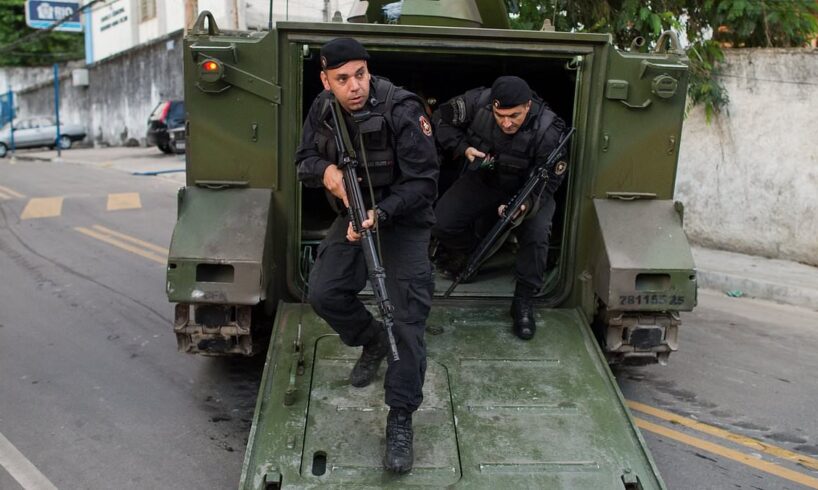
Fury has erupted in Brazil after lawmakers approved a law that would offer police large bonuses when they kill suspects or seize high-calibre weapons.
Under the controversial law, officers could earn extra payments worth between 10 and 150 per cent of their monthly salary for ‘neutralising criminals.
State lawmaker Alexandre Knoploch said during debate that ‘neutralise’ in practice means ‘kill.’
The so-called Wild West bonus was passed by the state assembly on September 23 with 45 votes in favour and 17 against.
It now sits on the desk of Governor Claudio Castro, who has 15 days to veto it or let it become law.
The measure was added to a wider bill that changes the career structure of Rio’s civil police, the branch that focuses on investigations.
The idea of paying bonuses to police for killing has sparked fury across Brazil and abroad. Human Rights Watch said the bill ‘encourages lethal force’ and ‘is a recipe for more brutality and impunity.’
César Muñoz, the group’s Brazil director, added: ‘Giving bonuses to police for killings is not only outright brutal but also undermines public security by creating a financial incentive for officers to shoot rather than arrest suspects.
‘A strategy that promotes shootouts endangers the health and lives of suspects, bystanders, and police officers themselves, while doing nothing to actually dismantle criminal organisations.’
The Attorney General’s Office has also told the governor to block the clause, saying it is unconstitutional and undermines the fundamental right to public safety.
Brazilian Police during an operation in Rio. Under the controversial new law, officers could earn extra payments worth between 10 and 150 per cent of their monthly salary for ‘neutralising criminals The governor of Rio de Janeiro, Claudio Castro at a summit in Sao Paulo. He now has 15 days to decide if he will veto the law or let it become law
The Federal Public Defender’s Office went further, filing a formal complaint and warning that the plan could be illegal.
This is not the first time Rio has tried a Wild West bonus – a similar scheme ran between 1995 and 1998 and was scrapped after a huge spike in killings.
Studies later showed many victims were shot in the back or neck while fleeing, raising evidence of extrajudicial executions.
Former state congressman Carlos Minc, who helped end the practice at the time, recalled that many of the killings had ‘no link to real shootouts.’
Despite the outrage, supporters argue the policy rewards officers who risk their lives fighting heavily armed gangs.
But critics say it will worsen the racial and social bias already seen in Rio’s policing.
In 2024, Rio’s military and civil police killed 703 people. Another 470 have been killed between January and August 2025.
Official data show that 86 per cent of those killed in 2024 were Black, far above their share of the population.
Brazil already has one of the highest rates of police killings in the world, with more than 6,000 deaths each year. Most victims are young Black men from poor neighbourhoods on the edge of cities.
In 2019, the first year of Jair Bolsonaro’s presidency, they killed more than 1,800 people, the highest total ever recorded.
Brazilian police taking part in an operation targeting drug trafficking in June 2025. The idea of paying bonuses to police for killing has sparked fury across Brazil and abroad Police escort a man suspected of drug trafficking. Critics say the law will worsen the racial and social bias already seen in Rio’s policing
But killings have since fallen, partly because of the introduction of body cameras.
Cameras were finally brought in during 2023 after years of resistance from state officials and an order from the Supreme Court.
Within the first year, deaths in police operations fell by 35 per cent. By 2024, the yearly toll dropped to 469, still more than one person killed per day, but the lowest figure in a decade.
The new law also strips independence from forensic services.
It hands the civil police’s elite CORE unit exclusive control of explosive forensics, even in cases where CORE itself is accused, and places fingerprint specialists in charge of crime labs and evidence.
Human rights groups say this makes oversight weaker and increases the risk of cover-ups.
Governor Castro is said to be leaning toward blocking the bonus, not only because of the damage it could do to Rio’s international image but also because of its high cost.
The state is still recovering from a financial collapse nearly ten years ago.
With elections on the horizon in 2026, when Castro is expected to run for the Senate or Chamber of Deputies, opponents believe he will not want the stain of approving cash rewards for killing.





